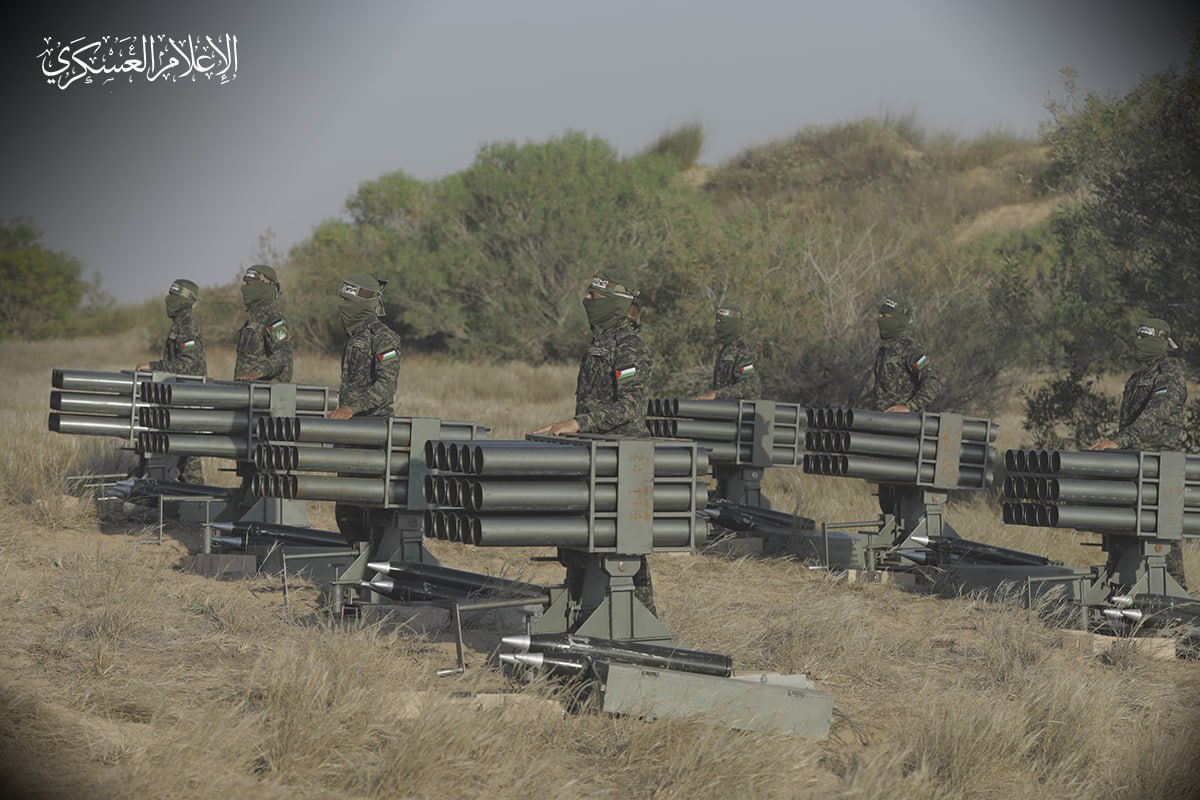How Hamas’ Offensive Creates Profound Implications for Insurgents across the World
By Rita Katz | Published 10.16.2023
If Israel was so vulnerable, what new threats might far-less adept, less-equipped nations soon face?

Image from Qassam Brigades, the military wing of Hamas
Hamas' heinous terrorist attack on Israeli civilians has implications far beyond the local Israeli-Palestinian conflict. The brutal, barbaric assault shattered conventional wisdom about Israel’s perceived strength, impenetrability, intel, and military capabilities, and has thus set a stirring precedent for terrorist groups across the world, from jihadists to the far right. As 9/11 sparked the global jihadi movement’s embrace of terrorist attacks, Hamas’ attack has provided a template for ambitious, strategically savvy offensives worldwide.
Immediately after Hamas began publishing news of its operation, Sunni and Shi’ite extremist factions alike began flooding social media platforms with celebratory messages, as did their scholars. The offensive—a prelude to a “Jihadi spring,” as al-Qaeda in the Indian Subcontinent (AQIS) put it—injected inspiration into their own fights. It is virtually unheard of for Shi’ite and Sunni extremists to be on the same page about a subject, yet here were all of their online outlets, forwarding mirroring deluges of updates from Hamas.
Not unexpectedly, Shi’ite militants from around the world rushed to support to Hamas. Although Hamas is Sunni, it shares a common backer with Shi’ite groups in Iran. What was surprising, though, was the support coming from al-Qaeda, which marked a major shift, given both groups’ longstanding mutual hostility.
Since 2006, al-Qaeda’s leadership and supporters have condemned Hamas for leveraging democracy to gain power. In 2007, after multiple statements criticizing Hamas, Osama bin Laden claimed Hamas had “lost its religion.” In 2018, Ayman al-Zawahiri declared, “Hamas is not an Islamic movement nor is Islam its reference.” Throughout these years, Hamas has reciprocated by arresting al-Qaeda aligned operatives and preachers in Gaza.
Father-in-law of al-Qaeda chief: "This war might expand outside the Arab region and reach from Tangier in Morocco to Jakarta in Indonesia."
Yet now, after almost 20 years of enmity, al-Qaeda has completely changed its tune following the attack in Israel. Official al-Qaeda entities and their supporters have roundly congratulated “our honorable loved ones, for these victories” and called to support the group by any means possible.
“The strength of this Ummah lies in the strength of its jihadi fronts, and its strength in supporting jihadi operations against the international coalition and occupiers,” exclaimed the Shabaab al-Mujahideen Movement, al-Qaeda’s affiliate in Somalia.
There are three major aspects of Hamas’ attack that need to be taken very seriously by the US and its allies as potential global threats and a paradigm shift in insurgency.
First, Hamas’ “Operation al-Aqsa Flood” offensive bolstered the very narratives Shi’ite and Sunni extremist groups alike have long espoused: endurance and steadfastness bringing victory, even if it takes years or decades to accomplished. As Tehrik-e-Taliban Pakistan put it, Hamas’ offensive “imparts a lesson” to underdog jihadi militants in Pakistan that “the enemies of Islam will surely turn back humiliated and tormented one day.”
Jihadist groups' long-term survival depends on such a narrative lifeblood, and Hamas’ offensive was immeasurably critical event to feed it. To that end, Hurras al-Deen, al-Qaeda’s branch in Syria, urged to “capitalize” on Hamas’ offensive to re-energize its own jihad:
…we recall the seriousness of the difficult circumstances that the Levantine arena is experiencing and the systematic, violent bombardment of Sunni areas. We should capitalize on these circumstances to retake the initiative and return jihad to its right path, away from international conspiracies and the interests of supporting countries and others.
Meanwhile, Shi’ite groups see the Hamas operation as validation of their own aspirations. They also see it as the fruition of Iran’s years of supporting Hamas against Israel—and thus validating their own struggles and the larger “resistance” networks to which they belong.
Guardians of the Blood Brigade, an Iraqi Shi’ite militant unit that has claimed attacks on US and other military targets, declared, “Today, the Islamic Resistance has proven once again that the Israeli enemy is weak and victory is on our side.”
Hamas' strategy of militant jihad now stands as a proven model of successful insurgency-building, as groups like AQIS now attest.
“This operation is a message that the only way to liberate the Muslim Ummah from the clutches of the Kuffar and Kuffar-made systems, is through jihad,” AQIS stated. “…even with scant resources and limited material power, we can bring Israel, backed and supported by the whole non-believing world, Europe and America, down to its knees.”
The second game-changing aspect of Hamas’ offensive is that its strategies can be exported to other countries. Extremist voices are calling on Muslims to rise up in their own lands, with al-Qaeda in the Arabian Peninsula (AQAP) urging, “Do not be deterred by the rulers of agency and dependence on the West and East.”
Listing “lessons learned” from the attacks, an al-Qaeda supporter praised Hamas’ investment in foreign-trained cadres able to “transform light weapons into a weapon of mass destruction.”
Mustafa Hamid, father-in-law of al-Qaeda chief Saif al-Adl and a prominent jihadi commentator residing in Iran, called upon jihadists to spread Hamas’ “Operation al-Aqsa Flood” across the region and beyond.
“This war might expand outside the Arab region and reach from Tangier in Morocco to Jakarta in Indonesia,” Hamid exclaimed, and gave directives to those in specific countries like Jordan, Turkey, Egypt, and others.
Shi’ite militant organizations in Azerbaijan, Iraq, Lebanon, and Yemen likewise used Hamas’ example to urge continued “eradication of the American tumor.”
Amid the chorus, jihadists are already devising their own ideas for their offensives. Listing “lessons learned” from the attacks, an al-Qaeda supporter praised Hamas’ investment in foreign-trained cadres able to “transform light weapons into a weapon of mass destruction.”
Meanwhile, the administrator of an Islamist Telegram channel analyzed Hamas’ al-Zouari suicide drone used in its offensive.
“The Ummah needs thousands of [people like drone designer] Mohamed Zouari,” the administrator stated. “Knowledge is one of the most important weapons in this era and the organized occupation requires organized resistance to confront it.”
Finally, Hamas’ use of urban warfare tactics has caused jihadist and other groups to pay close attention to the challenging operational environment. As one al-Qaeda-aligned commentator wrote, “Empowerment: Considering that the Palestinian fighters are in the Zionist settlements and urban warfare is involved, Israeli are unable to bomb them, because losses of those inside and the destruction of the urban infrastructure are not possible for the Zionists.”
Hamas’ attack is even stoking countries’ fears of the same happening to them—even by peer competitors. Citing Hamas’ actions, South Korea’s defense minister suggested suspending a 2018 agreement with North Korea and resuming front-line surveillance of it.
“Hamas has attacked Israel, and the Republic of Korea is under a much stronger threat,” he stated.
From here, deeply troubling questions emerge. If Israel was so vulnerable, what of far-less adept and well-equipped nations?
Perhaps even more concerning to Western countries is that neo-Nazis everywhere are also taking note. Accelerationist Neo-Nazi outlets have outpoured with lavish praise of Hamas and its killing of Jews while analyzing its methods. “The American Futurist,” an accelerationist outlet tied to Atomwaffen co-founder and Maryland substation attack plotter Brandon Russell published on its outlets:
…we ask our readers to study the current conflict in Israel at the moment as the IDF is very similar to the US Military even in equipment too… it is a study point on a homegrown paramilitary with smuggled/homemade weapons against the IDF in a major city combat situation…
In another of many examples, a message distributed by accelerationist neo-Nazi collective “Terrorgram”—whose propaganda and detailed attack guides are a driving force among far-right terrorists—cited lessons from Hamas’ attack:
The bloodshed we are witnessing (and thoroughly enjoying) today isn’t sporadic - it was planned and coordinated carefully between a lot of people over a long period of time…By planting the same seeds among those in our own Struggle today, it will be possible to cultivate the same glorious results when the time is right.
“If Arabs with bottle rockets, old broken guns, and rocks can do so much damage to kikes. Imagine what organized Whites can do against them,” wrote a user in an accelerationist chat group.
From here, deeply troubling questions emerge. If Israel was so vulnerable, what of far-less adept, less-equipped nations? What new plans are now culminating among deadly groups like the Shabaab, an increasingly powerful force which already controls large swathes of Somalia and has repeatedly attacked Mogadishu? And what of increasingly emboldened far-right terrorists in the West?
As the mindset of extremist groups has shifted following the attack, so must the responses of law enforcement and intelligence agencies. The price Israel paid is a grim example of being unprepared.

Rita Katz
Executive Director & Founder
Rita Katz is the founder and Executive Director of SITE Intelligence Group. She has tracked and analyzed global terrorist networks for decades and is well-recognized as one of the most knowledgeable and reliable experts in the field. She has infiltrated terrorist fronts, testified before Congress in terrorism trials, and briefed officials at the White House and Cabinet.
Ms. Katz has authored two acclaimed books on terrorism, Saints and Soldiers (Columbia University Press, 2022) and Terrorist Hunter (Harper Collins, 2003). To learn more about Rita Katz and SITE Intelligence Group, click here.






